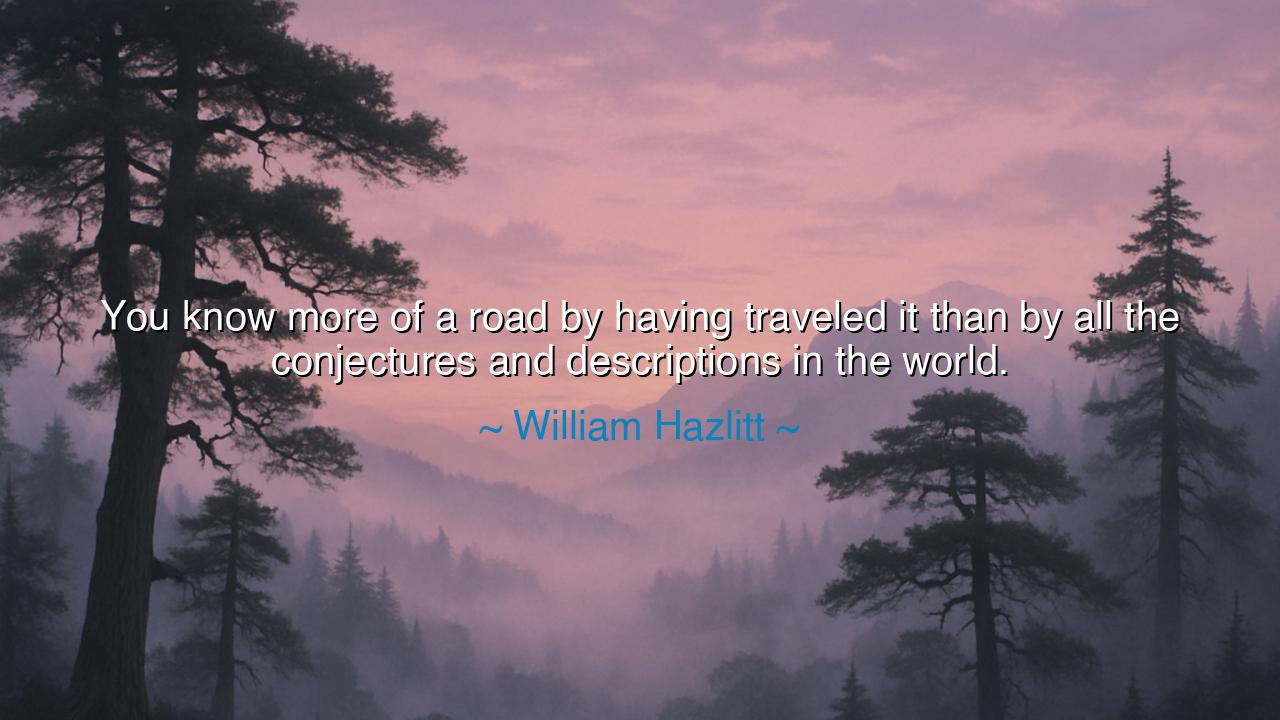
You know more of a road by having traveled it than by all the
You know more of a road by having traveled it than by all the conjectures and descriptions in the world.






Hear, O seekers of truth and wanderers of life’s path, the words of William Hazlitt, who declared: “You know more of a road by having traveled it than by all the conjectures and descriptions in the world.” This saying, though simple in form, strikes like a bell upon the soul, for it teaches us that true wisdom does not lie in talk or theory, but in the living of experience. To hear of a road is to imagine it; to walk upon it is to know it. And so too with life itself—no amount of speculation can replace the depth of knowledge gained through trial, action, and journey.
The ancients always revered the difference between knowledge of the mind and wisdom of the heart. The first may be gathered from scrolls and speeches, but the second must be lived. To travel the road is to feel its dust under your feet, its stones cutting into your soles, its turns surprising you at every corner. Words may describe, maps may predict, but only the traveler knows the taste of the wind upon that path, the fatigue of its length, the delight of its hidden springs. Hazlitt reminds us that experience is the teacher beyond all teachers.
Consider the story of Marco Polo. Long before he returned to Venice, men had conjectured about the East, spinning tales of its riches, its palaces, its strange wonders. Yet it was only when Polo himself traveled the road across deserts and mountains that he could tell the truth of what he had seen. Though many doubted him, his words carried the weight of footsteps, not of speculation. His was not the voice of conjecture, but of one who had walked the journey.
This wisdom is not only for travelers of land, but for all who journey through the trials of life. One may read of courage, but until one has faced fear, the meaning of courage remains hollow. One may discuss love endlessly, but until one has given and received it, with all its joys and wounds, love remains only a theory. The road of experience is the crucible where ideas are tested, where imagination becomes reality, where the soul is forged into strength.
Hazlitt’s words also caution us against arrogance. There are those who think that because they have read, studied, or heard, they understand. Yet their knowledge is like a painted feast—pleasing to the eye but empty to the stomach. The true feast is found only in the eating. To travel the road is to humble oneself before reality, to admit that no description, however eloquent, can equal the truth of lived experience.
The lesson, then, is this: do not linger forever in speculation or planning. If you wish to know, then act. If you wish to understand, then walk. Let your feet, your hands, your heart be your teachers. Step into the unknown road and let it shape you. For in the dust of experience lies wisdom greater than all the libraries of men.
Practically, this means daring to live fully. Do not be content only to listen to others’ stories—make your own. Do not be paralyzed by endless planning—take the first step. Travel, work, love, struggle, create. For only then will your knowledge be more than conjecture, more than borrowed description. It will be yours, carved into your memory, etched upon your soul.
So let this truth endure: The road is not known by words, but by walking. Hazlitt’s wisdom calls us to move from thought into action, from dream into journey. For the greatest discoveries await not the one who speculates, but the one who dares to walk.






AAdministratorAdministrator
Welcome, honored guests. Please leave a comment, we will respond soon